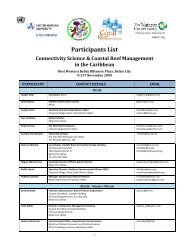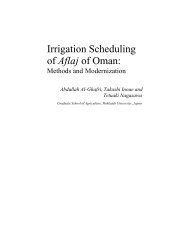The Global Water Crisis: Addressing an Urgent Security - Unu-inweh ...
The Global Water Crisis: Addressing an Urgent Security - Unu-inweh ...
The Global Water Crisis: Addressing an Urgent Security - Unu-inweh ...
Create successful ePaper yourself
Turn your PDF publications into a flip-book with our unique Google optimized e-Paper software.
Although cultural constraints still continue to impinge upon entry of women in water m<strong>an</strong>agement courses, <strong>an</strong>d the<br />
discrimination of women water professionals at entry points in water agencies <strong>an</strong>d their upward mobility within the sector<br />
continue, it is seen in some cases (such as in the Department of Irrigation Sri L<strong>an</strong>ka) that women’s entry <strong>an</strong>d contribution<br />
into the formal water m<strong>an</strong>agement sector is increasing (Kamaladasa, 2012).<br />
However, these positive ch<strong>an</strong>ges c<strong>an</strong>not happen on their own; they need to be proactively facilitated <strong>an</strong>d need highlevel<br />
political, administrative <strong>an</strong>d legal mech<strong>an</strong>isms to create <strong>an</strong> enabling environment in order to benefit both women<br />
professionals <strong>an</strong>d women in grassroots communities. More th<strong>an</strong> <strong>an</strong>y other factor, adequate resource allocation is necessary<br />
(UNESCO, 2012a).<br />
At the Fourth UN Conference on Least Developed Countries held in Ist<strong>an</strong>bul in 2011, UN Women’s Executive Director<br />
Michelle Bachelet questioned the continued low investment in rural women while reiterating that “investments in rural<br />
women’s access to productive resources <strong>an</strong>d fin<strong>an</strong>cial services c<strong>an</strong> have critical multiplier effects on rural development”<br />
(UN Women, 2012). <strong>The</strong> FAO State of Food <strong>an</strong>d Agriculture Report 2010-2011 states that investing in women in agriculture<br />
could increase yields <strong>an</strong>d decrease global hunger by 12-17%, or by between 100 <strong>an</strong>d 150 million people (FAO, 2011). At the<br />
launch of the Fourth World <strong>Water</strong> Development Report in March 2012, UNESCO Director-General Irina Bokova reiterated<br />
the need for a new leadership in water which c<strong>an</strong> “acknowledge, integrate <strong>an</strong>d strengthen the role of women” (UNESCO,<br />
2012b). It is time these global statements are operationalised at the local <strong>an</strong>d national levels by all concerned stakeholders.<br />
Conclusions<br />
Twenty years after the Dublin Principles were first enunciated at the Rio Earth Summit <strong>an</strong>d upheld the critical role of<br />
women in the international water sector, this area is yet to be fully recognised, accepted <strong>an</strong>d operationalized, especially<br />
in the irrigated agricultural sector of m<strong>an</strong>y Asi<strong>an</strong> countries, including Sri L<strong>an</strong>ka.<br />
Investment in women’s capacity development for achieving water security needs to focus on empowering women,<br />
especially those from disadv<strong>an</strong>taged communities. To ensure that women’s leadership <strong>an</strong>d expertise feed into thematic<br />
areas of work, such as guidelines <strong>an</strong>d initiatives related to l<strong>an</strong>d <strong>an</strong>d water allocation, investment in fin<strong>an</strong>cial <strong>an</strong>d hum<strong>an</strong><br />
resources, <strong>an</strong>d food processing <strong>an</strong>d food security, calls for a higher degree of research into women’s roles <strong>an</strong>d activities<br />
th<strong>an</strong> is available at present. <strong>The</strong> question of research into women <strong>an</strong>d water, however, is a vicious circle: because there<br />
are no (or minimal) funds allocated to research in this area, there are no data; <strong>an</strong>d because there are no data available,<br />
there is little evidence to subst<strong>an</strong>tiate the need to strengthen the role of women in m<strong>an</strong>agement <strong>an</strong>d decision-making<br />
in the water sector. An essential facilitating factor, the lack of gendered databases, has to be speedily addressed through<br />
appropriate resource allocation.<br />
In order to support women’s participation for generating positive impacts on community water security, a gendered<br />
allocation of necessary resources from budget lines of water agencies is essential. <strong>The</strong> adoption <strong>an</strong>d implementation of<br />
policies that protect women’s rights to l<strong>an</strong>d <strong>an</strong>d other productive resources, which ensure access to markets, fin<strong>an</strong>ces,<br />
information <strong>an</strong>d capacity development, are also critical supporting factors.<br />
<strong>The</strong>re is also <strong>an</strong> urgent need for states <strong>an</strong>d water agencies to remain convers<strong>an</strong>t with a fast ch<strong>an</strong>ging reality on the ground<br />
by regularly engaging with women civil society leaders, including networking with community-based org<strong>an</strong>izations of<br />
women in rural areas. State agencies <strong>an</strong>d civil society org<strong>an</strong>izations working in rural settings, especially in the Asi<strong>an</strong><br />
region, need to hire more women experts in all areas of work to create more gender-equitable institutions that focus on<br />
women’s empowerment.<br />
As stated at the recently concluded World <strong>Water</strong> Forum 6 in Marseilles: “After all the rhetoric, the time for solutions must really<br />
come now. Beyond speeches <strong>an</strong>d statements, our pl<strong>an</strong>et needs concrete <strong>an</strong>d credible acts” (World <strong>Water</strong> Council, 2012). This<br />
urgency is most keenly felt in the women <strong>an</strong>d water sector. Women are the most affected by threats to water security, <strong>an</strong>d<br />
this will be especially true as water security becomes increasingly contested due to the impacts of climate ch<strong>an</strong>ge. Women<br />
are as yet <strong>an</strong> under-utilized invisible force, <strong>an</strong>d given <strong>an</strong> enabling environment coupled with a greater democratization of the<br />
water sector, have the potential to become effective agents of ch<strong>an</strong>ge, a force without whom ch<strong>an</strong>ge is not possible. If there<br />
is to be a global move towards a more inclusive, dynamic development supporting water security for all, then the focus of<br />
global water initiatives has to be on mobilizing the hitherto sidelined resource, the Major Group of Women.<br />
106 <strong>The</strong> <strong>Global</strong> <strong>Water</strong> <strong>Crisis</strong>: <strong>Addressing</strong> <strong>an</strong> <strong>Urgent</strong> <strong>Security</strong> Issue




